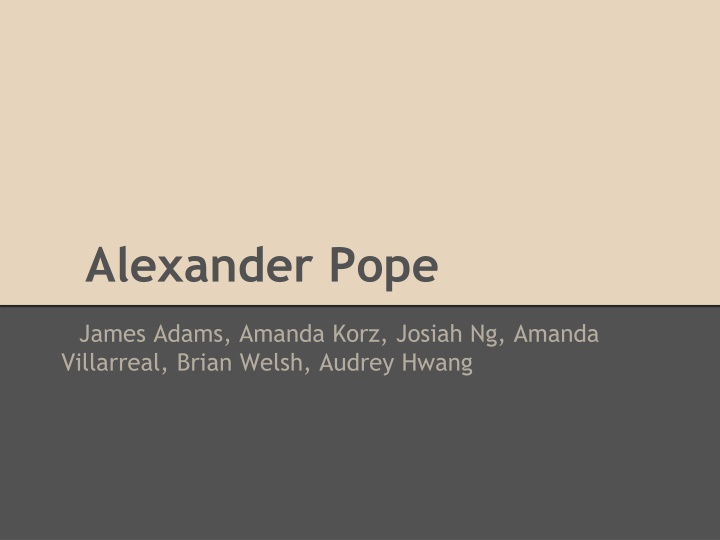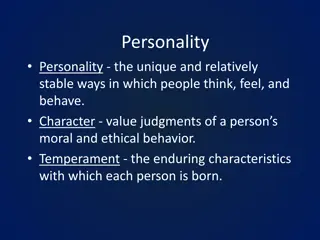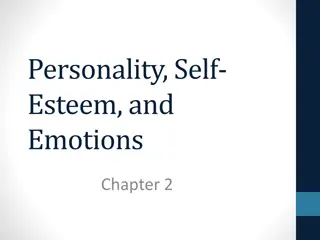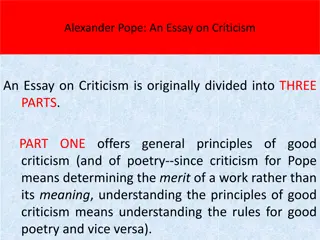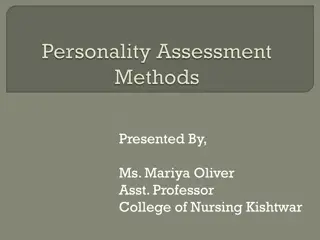Alexander Pope: Biography, Works, and Personality
Alexander Pope was a renowned English poet born in 1688. His works include "An Essay on Criticism," "Rape of the Lock," and translations of Homer's Iliad. Pope's personality, influenced by his Catholic upbringing, relationships with friends like Swift and Gay, and his poetic devotion, shaped his unique character. The historical context of Pope's era, marked by anti-Catholic sentiment, political turmoil, and literary boom, provides insights into his life and works.
Download Presentation

Please find below an Image/Link to download the presentation.
The content on the website is provided AS IS for your information and personal use only. It may not be sold, licensed, or shared on other websites without obtaining consent from the author.If you encounter any issues during the download, it is possible that the publisher has removed the file from their server.
You are allowed to download the files provided on this website for personal or commercial use, subject to the condition that they are used lawfully. All files are the property of their respective owners.
The content on the website is provided AS IS for your information and personal use only. It may not be sold, licensed, or shared on other websites without obtaining consent from the author.
E N D
Presentation Transcript
Alexander Pope James Adams, Amanda Korz, Josiah Ng, Amanda Villarreal, Brian Welsh, Audrey Hwang
Biography and Works Born May 21st, 1688 to Alexander and Edith Pope. 1698- went to Twyford School (Before he was taught by his aunt) 1700- his family moves to a small estate in Popeswood (Formal education ends and has to teach himself through books May 1709- Pastorals was published as part of Tonson's Poetical Miscellanies May 15th, 1711 An Essay on Criticism is published 1712- Rape of the Lock is published 1713- Windsor Forest is published Contributed to the play Cato by Addison. Pope also wrote for The Guardian and The Spectator Between 1716-19 Lived with his parents in Chriswick
Biography and Works Cont. 1715-1720 Translated Iliad 1719- With money earned from translating Homer, He buys a villa in Twickenham 1728-Dunciad (Published anonymously in Dublin, but everyone knew it was his) 1731- publishes "Epistle to Burlington", Moral Essays 1731-34 1732-34 Essay On Man 1733-38 Imitations of Horace May 30th,1744 Pope Dies
Alexander Pope's Personality Being Catholic, Pope was uninterested in university education and public employment. Devoted to His mother and his closest friends; Arbuthnot, Gay, and Swift. Pope always had the courage of saying about his beliefs, writing strongly to the end. Pope was not straightforward in his business dealings, unfortunately, and made enemies quickly. He was deeply interested in his relationship with God, but his interest was primarily poetic, not philosophical.
Historical Context and Environment Test Act (1673) - severely limited Pope's education Strong anti-Catholic sentiment and laws in English territory George I ascends to the throne, then afterwards George II; Rampant corruption, "moral, political, and cultural deterioration" Coffee: The fuel of minds! Literary Boom - The Rise of Satire Rising conflict between England and France Rising tension between Britain and Ireland
Historical Context Cont. Whigs and Tories Most of his friends and colleagues were Whigs, until the Whig party disbanded in 1710 Whig friends: William Walsh, Richard Steele, Joseph Addison, etc. Whig party largely disbands Tory friends: Jonathan Swift, John Gay (Beggar's Opera), Thomas Parnell Rise of the moneyed wealth as opposed to landed wealth Increasing gap between low income classes and high income classes
The Rape of the Lock Pope writes of a dire offense Ariel warns of an impending trouble The Baron intends on cutting a lock of Belinda's hair He does so on his third try Umbriel gives Belinda a bag & a vial A fight breaks out Belinda's lock will live forever
The Rape of Lock - Satire Satirization of trivial real life situations Heroic-verse & Epic cliches
The Rape of the Lock Symbolism - Sylphs - a connection between earth and heaven - Canto 1, 75-77 - element of air - Aristotlean elements - Sky/air is the bridge between God and man - seem to orchestrate everything - Canto 1, 104-5 - Pope can communicate with Sylphs? - Canto 4, 165
The Rape of the Lock Symbolism - Allusions to classic tradition, chivalry - altars = tables - Canto 3, 107 - metaphor to knight hood - Canto 3, 127-134 - Belinda is constantly surrounded by mythological spirits - Canto 4, 11-16 - Canto 4 and 5 are loaded with Greek mythological figures - Canto 4: 52, 83, 93 - Canto 5: 2, 5, 47 (four gods! FOUR) - Canto 5, 48-52: An Olympian overreaction - gods are linked to resolution
